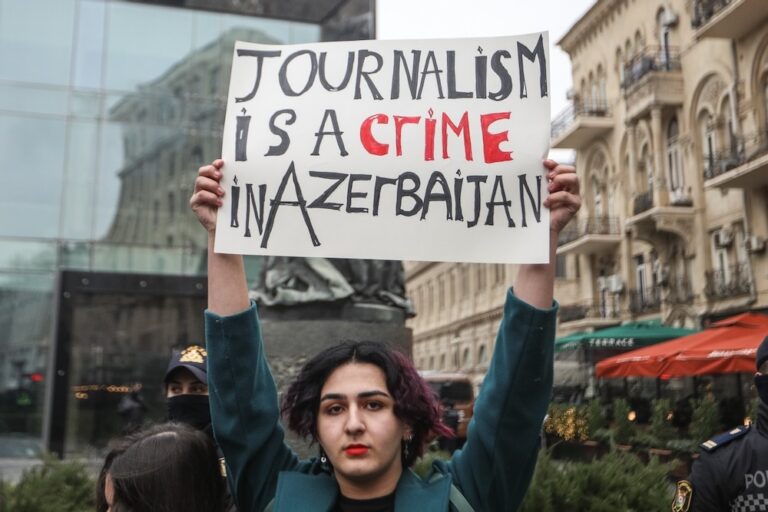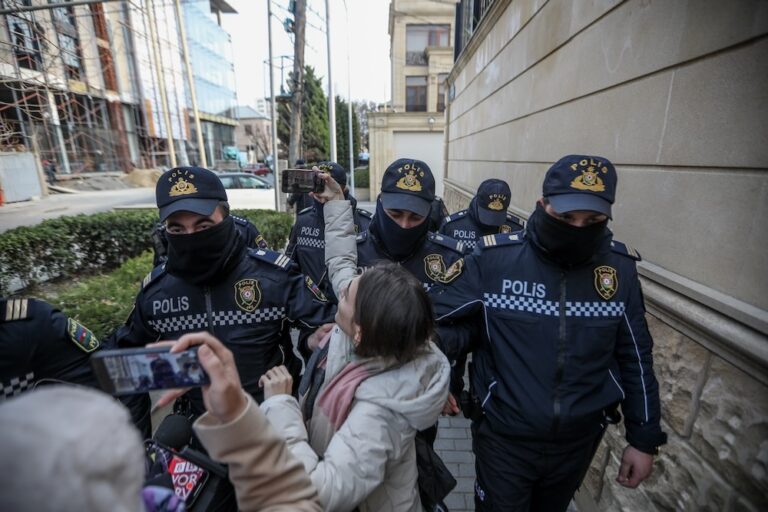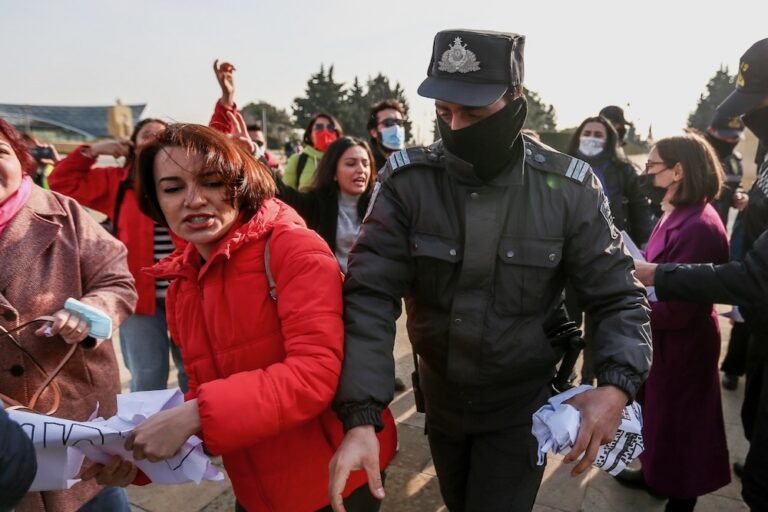The International Partnership Group for Azerbaijan strongly condemns a series of repressive legislative amendments that Azerbaijan’s National Assembly adopted on 14 May 2013. The existing penalties for criminal defamation and insult have been extended to online content and public demonstrations.
The International Partnership Group for Azerbaijan (IPGA) strongly condemns a series of repressive legislative amendments that Azerbaijan’s National Assembly (Milli Majlis) adopted on 14 May 2013. The amendments were submitted by the prosecutor-general’s office to a parliamentary commission two weeks before and are being enacted in the run-up to October’s Presidential election.
The existing draconian penalties for criminal defamation and insult have been extended to online content, including Azerbaijan’s vibrant social networks, and public demonstrations. The permitted length of “administrative” detention – detention without referring to a court – is now much greater for many offences.
“The amendments seek to ban criticism and increase the cost of dissent. They are designed to silence all those who continue to speak out despite the already and increasingly repressive climate,” the undersigned organisations said.
“By extending the offences of criminal defamation and insult to a broader range of public expression, including online expression and public demonstrations, Azerbaijan is breaking the commitments to reform made by President Ilham Aliyev and moving against the international trend to decriminalisation. At the same time, the police are given a free hand to administratively detain anyone for up to two months for organising an unauthorised protest or for disobeying them.”
“With just months to go to a presidential election in October, the authorities are clearly more determined than ever to intimidate critics of the regime, in particular online. The environment for freedom of expression is declining by the day as journalists, bloggers and opposition activists are subjected to mounting pressure that includes increasingly repressive laws, arrests, physical attacks and smear campaigns.”
“The international community must, as a matter of urgency, remind the Azerbaijani government of the undertakings it has made to protect the right to freedom of expression, including online, and ensure Azerbaijan implements the legal reforms necessary to meet these commitments.”
Regressive provisions on defamation and insult
The offences of criminal defamation (article 147 of the penal code) and insult (article 148 of the penal code) have been amended to include expression on the Internet and expression at public demonstrations. The maximum penalties for both offences remain six months imprisonment, although this may be extended to three years imprisonment for aggravated instances of defamation (Article 147.2 of the penal code).
The inclusion of all expression on the Internet broadens the scope of criminal defamation significantly, suggesting that communications on social network sites could give rise to criminal liability. This is particularly concerning since constraints on political activism and a lack of media diversity have made the Internet the main refuge of freedom of expression and political dissent in Azerbaijan.
“The amendments to the criminal code passed by the parliament are a blatant political move and a shabby attempt to hijack online freedoms amid a mounting pre-election crackdown’, said Emin Huseynov, chairman of the Institute for Reporters’ Freedom and Safety (IRFS).
These amendments have again proven what little importance the Azerbaijani government has attached to its pledges to decriminalize defamation. President Aliyev has been undertaking to do this since 2006, and according to the “National Programme for Reinforcing Human Rights,” adopted in 2011, it should have been done in 2012.
These amendments also directly contradict undertakings that Azerbaijan has given to the Council of Europe and the Organization for Security and Cooperation in Europe.
Restrictions on right to protest
The other amendments adopted on 14 May lengthen the permitted period of administrative detention for many offences, including those relating to the expression of dissent. The penalty for “organizing an unauthorized demonstration” (Article 298 of the code on administrative offences), for example, has been increased from 15 to 60 days. The penalty for “disobeying the police” is increased from 15 to 30 days (Article 310 of the code on administrative offences).
This move further limits the climate for Azerbaijani citizens to exercise their right to freedom of assembly. No protests have been sanctioned in the centre of the capital Baku since 2006, leading many to feel that they have no choice but to participate in unsanctioned protests. In November 2012, amendments were made that exorbitantly increased the administrative fines for those participating or organising unsanctioned protests. For example, the maximum fine for participating in unsanctioned public gatherings was increased from 955 EUR to 7,600 EUR.
In January 2013, the same month the November 2012 amendments came into effect, there was a wave of public protests both in Baku and elsewhere. More than 20 people were issued fines while a number of people were sentenced to several days in administrative detention, including the well-known blogger, Emin Milli (who received the then maximum of 15 days). An opposition leader and potential presidential candidate, Ilgar Mammadov, was arrested on 4 February 2013 after travelling to Ismailli, the site of another recent protest, and was charged with “organising mass disorder” and “violently resisting police”. He has remained in pre-trial detention ever since and his appeal for bail was denied on 8 April. More than 50 Azerbaijani civil society organisations believe Mammadov’s arrest to be politically motivated.
Harassment of the media
The legislative vice has been tightened at a time when journalists and bloggers are being constantly harassed. Yafez Akramoglu, a reporter for Radio Free Europe/Radio Liberty’s (RFE/RL) Azerbaijani-language service reported yesterday that he was threatened by a Nakhchivan Autonomous Republic security official five days ago while reporting on the Nakhchivan diaspora in Istanbul.
RFE/RL issued a public protest a few weeks ago about the harassment of two of its journalists, Khadija Ismayilova and Yafez Hasanov. The intermittent smear campaign against Ismayilova resumed at the end of April 2013 with the posting of obscenely doctored photos on a new pro-government propaganda site. Hasanov, who is based in Nakhchivan, has since 4 April been the subject of attempts by the Nakhchivan security services to get him collaborate with them or stop working as a journalist.
The opposition daily Azadlig‘s main bank account has been blocked again since 16 April, after it was ordered to pay astronomic damages for supposedly libelling the Baku subway authority chief. Transport ministry inspectors attacked two Azadlig journalists, Seymour Khazyev and Khalig Garayev, while they were doing a report on 27 April.
Tolishi Sado editor Hilal Mammedov’s trial is continuing, while Avaz Zeynalli, the editor of the newspaper Khural, has appealed against a nine-year jail sentence. Both are still detained.
Growing pressure on Internet users
The authorities also clearly have their sights on Internet users. The blogger Reshad Hagigat Agaaddin’s family reported that he was arrested on 10 May on a trumped-up charge of possessing drugs.
Agaaddin often posted comments on Facebook calling for justice and freedom, criticizing the government’s anti-religion policies and mocking the president’s plans for a third term, suggesting that he “clearly wants to get into the Guinness Book of Records.” One of his blogs referred to the Aliyev regime as “devilish.”
Seven young members of the opposition movement N!DA (Shout) have been in detention since their arrests in March and April 2013 on unsubstantiated charges of possessing drugs or firearms. They are above all known for their activism on online social networks. Similarly, a youth activist with the Popular Front Party (AXCP), was arrested in March for drug possession following a series of critical posts on Facebook and other social media. He was known to participate regularly in public protests. All eight activists remain in pre-trial detention.
Three more young activists – Turgut Gambar, board member of N!DA, Abulfaz Gurbanly, Chairman of the Youth Committee of the Popular Front Party, and the activist, Ilkin Rustamzade, a member of the “Free Youth” organisation who was involved in organising the “end soldier deaths” protests held earlier this year through Facebook – were arrested on 30 April 2013 and sentenced to 10 days administrative detention for participation in a memorial rally for victims of a 2009 terrorist attack.
The blogger Nilufer Magerramova died in a fall from her balcony in the northern city of Mingachevir on 7 May 2013. Her friends said the police had been harassing her during the preceding weeks, but this was denied by the prosecutor’s office, which said her death was suicide.
Azerbaijan was ranked 156th out of 179 countries in the press freedom index that Reporters Without Borders published in January. The situation has worsened steadily since then.
The undersigned organisations call on the Azerbaijani authorities to:
• Respect and promote the right to freedom of expression and peaceful assembly, including online;
• Honour their commitment to decriminalise insult and defamation;
• Abolish administrative detention as a penalty for organising or holding an unauthorised assembly;
• Stop using bogus criminal or administrative penalties to punish the expression of dissent;
• Cease the practice of harassing media workers and bloggers;
• Immediately and unconditionally release Hilal Mammedov, Avaz Zeynalli, Zaur Gurbanli, and all other journalists, bloggers and activists currently detained or imprisoned in connection with exercising their right to free expression.
Signed by:
Civil Rights Defenders
International Media Support
Media Diversity Institute
Norwegian Helsinki Committee


